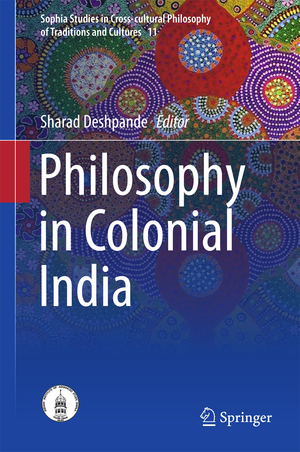Philosophy in Colonial India: Sophia Studies in Cross-cultural Philosophy of Traditions and Cultures, cartea 11
Editat de Sharad Deshpandeen Limba Engleză Hardback – 28 mai 2015
The issue of colonialism and emergence of new identities in India has engaged the critical attention of scholars from diverse fields of inquiry such as history, sociology, politics, and subaltern studies. However, till today the emergence of modern Indian philosophy remains an unexplored area of inquiry. Much of the academic philosophical work of this period, despite its manifest philosophical originality and depth, stands largely ignored, not only abroad, but even in India. This neglect needs to be overcome by a re-reading of philosophical writings in English produced by scholars located in the universities of colonial India. This edited volume will facilitate further explorations into the presence of colonial tensions as they are visible in the writings of modern Indian academic philosophers like B. N. Seal, Hiralal Haldar, Rasvihary Das,, G. R. Malkani, K. C. Bhattacharyya, . G. N. Mathrani and others.
| Toate formatele și edițiile | Preț | Express |
|---|---|---|
| Paperback (1) | 559.99 lei 39-44 zile | |
| Springer India – 23 oct 2016 | 559.99 lei 39-44 zile | |
| Hardback (1) | 570.72 lei 39-44 zile | |
| Springer India – 28 mai 2015 | 570.72 lei 39-44 zile |
Din seria Sophia Studies in Cross-cultural Philosophy of Traditions and Cultures
-
 Preț: 395.25 lei
Preț: 395.25 lei - 18%
 Preț: 726.69 lei
Preț: 726.69 lei - 15%
 Preț: 701.72 lei
Preț: 701.72 lei - 15%
 Preț: 651.67 lei
Preț: 651.67 lei - 18%
 Preț: 736.32 lei
Preț: 736.32 lei - 18%
 Preț: 782.10 lei
Preț: 782.10 lei -
 Preț: 375.53 lei
Preț: 375.53 lei - 24%
 Preț: 1038.18 lei
Preț: 1038.18 lei -
 Preț: 375.45 lei
Preț: 375.45 lei -
 Preț: 376.15 lei
Preț: 376.15 lei -
 Preț: 378.64 lei
Preț: 378.64 lei -
 Preț: 377.55 lei
Preț: 377.55 lei - 20%
 Preț: 559.19 lei
Preț: 559.19 lei - 20%
 Preț: 568.43 lei
Preț: 568.43 lei - 20%
 Preț: 511.15 lei
Preț: 511.15 lei - 20%
 Preț: 559.19 lei
Preț: 559.19 lei - 20%
 Preț: 567.62 lei
Preț: 567.62 lei - 24%
 Preț: 590.52 lei
Preț: 590.52 lei - 24%
 Preț: 794.96 lei
Preț: 794.96 lei - 24%
 Preț: 585.64 lei
Preț: 585.64 lei - 20%
 Preț: 521.57 lei
Preț: 521.57 lei -
 Preț: 378.64 lei
Preț: 378.64 lei -
 Preț: 479.29 lei
Preț: 479.29 lei - 20%
 Preț: 554.66 lei
Preț: 554.66 lei - 20%
 Preț: 569.85 lei
Preț: 569.85 lei - 15%
 Preț: 578.67 lei
Preț: 578.67 lei - 20%
 Preț: 556.90 lei
Preț: 556.90 lei - 18%
 Preț: 949.10 lei
Preț: 949.10 lei
Preț: 570.72 lei
Preț vechi: 713.40 lei
-20% Nou
Puncte Express: 856
Preț estimativ în valută:
109.21€ • 113.80$ • 90.42£
109.21€ • 113.80$ • 90.42£
Carte tipărită la comandă
Livrare economică 31 martie-05 aprilie
Preluare comenzi: 021 569.72.76
Specificații
ISBN-13: 9788132222224
ISBN-10: 8132222229
Pagini: 274
Ilustrații: XIII, 272 p. 1 illus.
Dimensiuni: 155 x 235 x 22 mm
Greutate: 0.58 kg
Ediția:2015
Editura: Springer India
Colecția Springer
Seria Sophia Studies in Cross-cultural Philosophy of Traditions and Cultures
Locul publicării:New Delhi, India
ISBN-10: 8132222229
Pagini: 274
Ilustrații: XIII, 272 p. 1 illus.
Dimensiuni: 155 x 235 x 22 mm
Greutate: 0.58 kg
Ediția:2015
Editura: Springer India
Colecția Springer
Seria Sophia Studies in Cross-cultural Philosophy of Traditions and Cultures
Locul publicării:New Delhi, India
Public țintă
ResearchCuprins
Chapter 1. Modern Indian Philosophy: from colonialism to cosmopolitanism.- Chapter 2: Thought and Context: Philosophy on the eve of Colonialism.- Chapter 3: Philosophy in Colonial India: The Science Question.- Chapter 4: The Self and its Knowledge: The Legacy of Rasvihary Das.- Chapter 5: Brajendranath Seal: A Disenchanted Hegelian.- Chapter 6: The Notion of Absolute: Hegel and Hiralal Haldar.- Chapter 7: G.R.Malkani: Reinventing Classical Advaita Vedānta.- Chapter 8: K.C. Bhattacharyya and Spivak on Kant: Colonial and Postcolonial Perspectives, Lessons and Prospects .- Chapter 9: The Road Not Taken: G.N.Mathrani’s Wittgensteinian Transformation of Philosophy.- Chapter 10: Radical Translation: S.R. Rajwade’s Encounter with F.W. Nietzsche.- Chapter 11: Tagore’s Perception of the West.- Chapter 12: Bankim Chandra on Morality.- Chapter 13: Colonialism and Traditional Forms of Knowledge: Then and now.
Recenzii
“All the essays vie with one another in matter of seriousness and thoroughness. It is an idea-packed and information-packed piece of work readers get once in a very long time. … a great book on a hitherto less explored theme. I am sure it will get wide readership and popularity. My appeal to Indian Institute of Advanced Study, as also to Deshpande, is that they should go for its sequel, PICI (II), without waiting for the reception of the volume.” (Sibnath Sarma, Journal of Indian Council of Philosophical Research, Vol. 33, 2016)
“The present volume is certainly an important contribution to the intellectual history of contemporary India. It deserves to be called a rich collection of cross-cultural studies in philosophy which dispels certain popular myths associated with philosophy that was practiced in colonial India.” (Amitabha Dasgupta, Sophia, Vol. 55, 2016)
“The present volume is certainly an important contribution to the intellectual history of contemporary India. It deserves to be called a rich collection of cross-cultural studies in philosophy which dispels certain popular myths associated with philosophy that was practiced in colonial India.” (Amitabha Dasgupta, Sophia, Vol. 55, 2016)
Notă biografică
Professor Sharad Deshpande is Tagore Fellow (2012-2014) at the Indian Institute of Advanced Study in Shimla, India. He obtained his M.A. (1971) and PhD (1976) from University of Pune. His doctoral dissertation A Critical Examination of Gauḍapāda’s MāṇḍūkyaKārikās received The Gurudeo R.D.Ranade–Damle Prize for the best PhD dissertation in Philosophy. His teaching and research career in the core areas of philosophy in Western tradition spans over 34 years at University of Pune. As British Council visiting fellow he has lectured at Oxford, Liverpool, and Aberdeen University in 1990, and as I.C.P.R. visiting fellow he visited Maison De Sciences de l’aHomme, Paris in 2008. As the resident fellow of Indian Council of Philosophical Research (1987) he researched on the nature of Negative Action. Among the memorial/endowment lectures he gave at various fora include Pratap Seth Vedānta Lecture at Indian Philosophical Congress Annual Session (1997)
Textul de pe ultima copertă
This volume focuses on the gradual emergence of modern Indian philosophy through the cross-cultural encounter between indigenous Indian and Western traditions of philosophy, during the colonial period in India, specifically in the 19th and early 20th centuries. This volume acknowledges that what we take ‘Indian philosophy’ or ‘modern Indian philosophy’ to mean today is the sub-text of a much wider, complex and varied Indian reception of the West during the colonial period. Consisting of –twelve chapters and a thematic introduction, the volume addresses the role of academic philosophy in the cultural and social ferment of the colonial period in India and its impact on the development of cross-cultural philosophy, the emergence of a cosmopolitan consciousness in colonial India; as also the philosophical contribution of India to cultural globalization.
The issue of colonialism and emergence of new identities in India has engaged the critical attention of scholars from diverse fields of inquiry such as history, sociology, politics, and subaltern studies. However, till today the emergence of modern Indian philosophy remains an unexplored area of inquiry. Much of the academic philosophical work of this period, despite its manifest philosophical originality and depth, stands largely ignored, not only abroad, but even in India. This neglect needs to be overcome by a re-reading of philosophical writings in English produced by scholars located in the universities of colonial India. This edited volume will facilitate further explorations into the presence of colonial tensions as they are visible in the writings of modern Indian academic philosophers like B. N. Seal, Hiralal Haldar, Rasvihary Das,, G. R. Malkani, K. C. Bhattacharyya, . G. N. Mathrani and others.
The issue of colonialism and emergence of new identities in India has engaged the critical attention of scholars from diverse fields of inquiry such as history, sociology, politics, and subaltern studies. However, till today the emergence of modern Indian philosophy remains an unexplored area of inquiry. Much of the academic philosophical work of this period, despite its manifest philosophical originality and depth, stands largely ignored, not only abroad, but even in India. This neglect needs to be overcome by a re-reading of philosophical writings in English produced by scholars located in the universities of colonial India. This edited volume will facilitate further explorations into the presence of colonial tensions as they are visible in the writings of modern Indian academic philosophers like B. N. Seal, Hiralal Haldar, Rasvihary Das,, G. R. Malkani, K. C. Bhattacharyya, . G. N. Mathrani and others.
Caracteristici
Defines a new area of inquiry into the reinvention of classical Indian philosophy under colonialism Provides thematic unity with fresh insights into some of the key writings by major Indian philosophers of the colonial period Contributes significantly to studies on cross-cultural philosophy Includes supplementary material: sn.pub/extras














